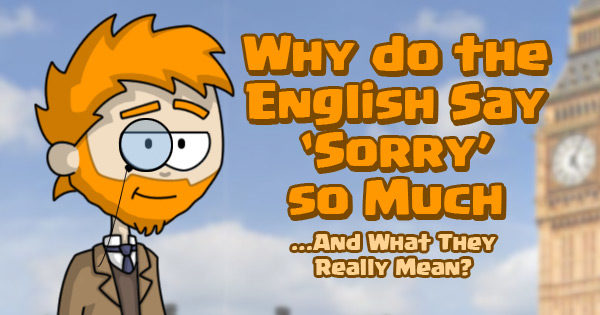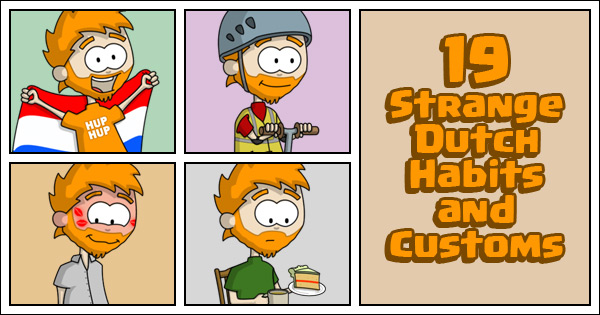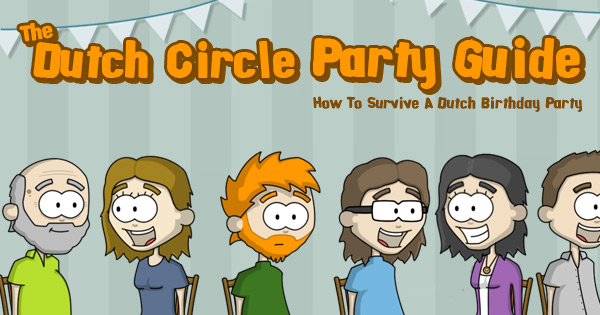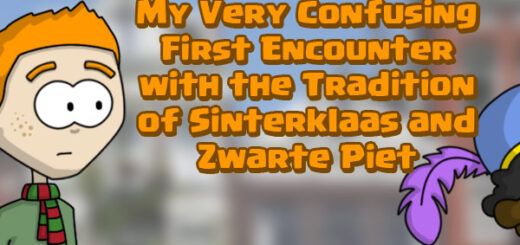Why do the English Say ‘Sorry’ so Much and What do They Really Mean?

In the long history of apologies, there is possibly no other nationality that has uttered the word ‘sorry’ more often than the English. We are well known for it. It’s something we can’t help doing. Even if there is nothing that needs apologizing for we will apologize, just in case. I’m sorry. That’s just the way we are.
To add to the confusion, the English don’t just use the word ‘sorry’ for apologies. In fact, we have developed many different uses of the word. It’s become a standard part of our everyday conversations. So much so that it can become confusing to understand what the English really mean when they say, “Sorry.”
That’s why, as an Englishman myself, I have decided to share with you some of the secrets behind the different ways we use the word. Sorry to all my fellow English people for giving away our secrets.
1) The Normal English Sorry
Not all English uses of the word sorry are weird. Sometimes they are just used for normal apologies. Their use can just be excessive sometimes is all. The English use of the word sorry as an apology is very versatile. It can range from everything from, “Sorry I drunk the last of the milk,” to, “Sorry that I just ran over your foot with my car.”

True Meaning: “I am sorry.”
2) The Over the Top Sorry
If an English person ever feels like they have done something really bad their embarrassment and guilt will go into overdrive. There is nothing the English hate more than to be the cause of a problem. We much prefer complaining about a problem. Being on the other side of the equation makes us deeply uncomfortable. In an effort to show how truly sorry we are our apology will get stuck on a loop. There will be lots of, “Oh goodness,” and, “I can’t believe I’ve just done that,” and, “I’m so, so sorry.”
The only problem is that this kind of apology usually ends up being very annoying for the person receiving it.
True Meaning: “I throw myself on your mercy and beg your forgiveness so that I may stop feeling so guilty.”
3) The Sorry Greeting
It might seem strange (like many things on this list) but the word sorry is often used as a kind of greeting. It is utilized to get someone’s attention. Maybe it is a waiter in a restaurant from whom you wish to order or a stranger on the street you want to pass. In these cases, the word ‘sorry’ has a multilayered meaning. It gets the person’s attention and lets them know you require something from them. The actual request is rarely made (beyond hand gestures) in an effort to keep human interaction to a minimum.
It is worth noting that this tactic rarely works on Dutch waiters.

True Meaning: “Hello. Sorry to interrupt what you were doing but I require your attention and/or assistance if that is at all possible.”
4) The Request Sorry
If an English person wants something (when other nearby people might also want it) they will often point to the item in question and simply say, “sorry.” The word acts as an unsaid request since it would simply be too rude to actually ask for the desired item. A prime example of this is when asking for the last biscuit on a plate.
The whole thing is a scam of course. Sorry is used as a way of forcing the other people into a corner where it would be impolite for them to say no.
True Meaning: “I want that thing and it would be rude of you to deny me it since I asked so politely.”
5) The Sorry, What?
If an English person miss-hears (or does not hear) something you said they will often loudly and sharply exclaim the word, “sorry,” while turning an ear in your direction. This is an indication that they want you to repeat yourself but louder. With each subsequent miss-hearing the ear will get uncomfortably closer and closer to your face with additional interruptions of, “No, sorry.”

True Meaning: “Speak up. I can’t hear you. You are too quiet.”
6) The Consequences Protection Sorry
The English are not always as polite as they would have you think. Not all our apologies are honest. Sometimes we will use them tactically. If we want to say something rude to you we will often start a sentence with, “I’m sorry but…”
What then follows will be some negative comment about your hair, dress sense or personality. The use of the word ‘sorry’ in this case is as protection. It means you are not allowed to get angry because we already apologized and we’re only being honest.
True Meaning: “I am shielded from the consequences of what I am about to say. It will, in fact, be you who are rude if you ignore my pre-emptive apology by getting angry.”
7) The Confused Sorry
The English like to pretend that they know everything but the truth is we sometimes get confused too. If we’re unable to understand something that is being explained to us we will often reply with a small shake of the head and a “sorry.” It’s both an apology and a request. An apology for not being smart enough and a request for you to explain the concept to them again using smaller words.

True Meaning: “I have no idea what you are talking about. You must be explaining it wrong.”
8) The Sympathy Sorry
The English are not great with emotions. Emotions can be awkward, embarrassing things. When hearing someone’s tragic story about how their cat died, they lost all their money or they got sick an English person will often reply with, “I’m sorry.”
It is heartfelt but it also allows them to inform the other person they have their sympathy while displaying the minimal amount of actual emotion. It also avoids being ‘impolite’ by keeping the conversation going. After all, it is clearly a matter of some distress for the other person.
Unfortunately, this tactic often makes it sound more like the English person is actually apologizing for being the one who killed their cat, stole their wallet or sneezed in their face.
True Meaning: “You have my sympathy. I hope you feel better now. I will make us tea if it helps.”
9) The Shocked Sorry
When something unexpectedly rude is said to an English person they will sometimes react in shock by saying, “I’m sorry,” or “I beg your pardon.” It’s something that happens a lot in old novels about high society. Either way, it’s weird that the person having the rude thing said to them would be the one to react with an apology. There are a few ways this use of the word ‘sorry’ could be interpreted. It could either be:
- An apology on behalf of the other person
- An apology for what must have been them misunderstanding the person
- The act of rudeness has so overloaded the English persons brain that they start spouting random apologies.

True Meaning: “How rude! I hope for both our benefits that I miss-heard you.”
10) The ‘Just in Case’ Sorry
Sometimes the English will just apologize even if nothing has happened. The apology could be for something that will happen, might happen, could happen in theory under rare circumstances or might have happened in a parallel universe. You never know when something that needs apologizing for might happen so it is best to be prepared.
True Meaning: “If anything goes wrong I want it noted that I already apologized for it.”
11) The Apology Sorry
The English use the word ‘sorry’ so much that it often gets pointed out to them. Sometimes we are asked to stop apologizing so much. Either it has become annoying for the other person in the conversation or they no longer think we sound sincere. When this happens some of us do the worst thing possible, we say sorry for how often we say sorry. We can’t help it. It’s an automated reaction. Sorry.
This has been known to send the other person in the conversation into a rage.

True Meaning: “I am sorry. Oops. Sorry. No, I mean sorry. Sorry. I’ll stop now. Sorry.”
12) The No Thank You
You might think a ‘thank you’ is the opposite of a ‘sorry’ but you’d be wrong (sorry about that). The English do not like to turn down hospitality for fear of being seen as rude. We will sometimes endure the most horribly made tea rather than turn it down and risk hurting our host’s feelings. However, when it is truly too much to bear we will say, “No Thank you.” It thanks them for the offer but it also subtly says sorry for not accepting it.
True Meaning: “I acknowlage your offer but politely decline. I am sorry for not accepting your attempt at hospitality.”
Thank you for taking the time to read this list. Sorry that it was so long. If I’ve missed any kind of English uses of the word ‘sorry’ please add them in the comments below (and my apologies for not writing them down myself).












As an English person I must appologise for our use of Sorry, but its inbread in us. We learn it at our mothers knee. Sorry.
So what you are saying is I learned it from you?
I am sorry but you are wrong :-).
I am sorry that I am wrong :)
‘I beg your pardon’, ‘Pardon (me)’ and ‘Excuse me’ are some other forms of sorry?
I beg your pardon is a weird one that can be used in anger as well. Meaning how dare you say that :-). Or perhaps that is just me ;-).
I’ve heard ‘I beg your pardon’ used that way a lot too.
I also feel that I always want to say ‘het spijt me’ to Dutch people just so they understand how sorry I am fo literally anything. Their ‘sorry’ simply just doesn’t have enough emphasis on it, but I am always told that I don’t need to spijt mezelf just because I dont want another cup of tea. It’s hard being a Brit sometimes xD
‘Het spijt me’ is a great one. It feels like it has real weight to it, like I should be saying it while throwing myself at their feet.
I’d say “het spijt me” should be used when you’re really sorry for something you caused yourself (so for something which is your fault). F. e. when you accidentally hurt someone.
In other cases “sorry” is fine. You’re right, it doesn’t have a lot of emphasis on it, but a lot of emphasis is also not needed in these cases.
Also what I find very useful is to say something like “Wat ontzettend vervelend voor je.” when people have problems that were not caused by me. Cause in this way, it’s not awkward because it seems like you’re apologizing for something you did yourself. Besides, you’re making it about the feelings of the affected person, which is sympathetic and is generally received well.
Here in the ‘colonies’ (aka the US) another one is ‘excuse me’. People just walking past you..”Excuse me…” A lot of the times I have to bite my lips to not reply. And one time, I just had to reply. Walking in a mall. Census taker: “Excuse me, Sir…” So I replied: “Sure. You are excused…” And kept on walking.
Very nice :-)